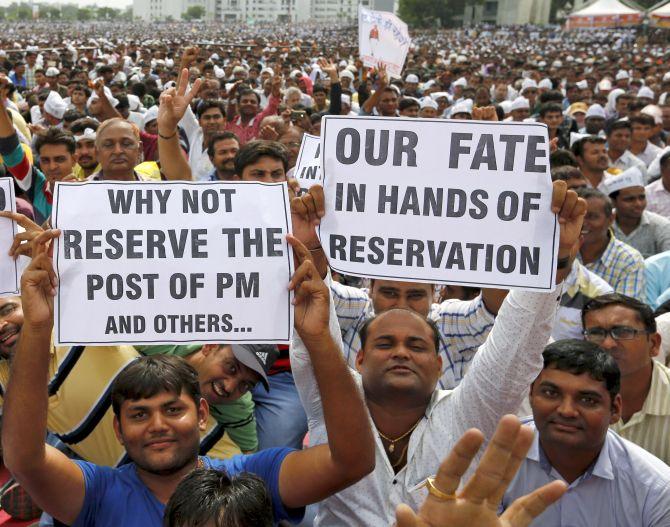'Education in private and public schools should be in English and in one regional language; it will solve the entire reservation issue.'

With the 2019 general election round the corner, the government on Monday, January 7, cleared a 10 per cent job and education quota for 'economically weaker' sections.
Many, including the Congress party, have called this move an election gimmick as the Supreme Court has already ruled that not more than 50 per cent of reservations can be provided in jobs or in education.
"We should shift this entire debate to imparting education in one language across India," Kancha Ilaiah Shepherd, a prominent thinker on caste issues, tells Syed Firdaus Ashraf/Rediff.com.
What is your reaction to the 10 per cent reservations proposed for the economically poor within the upper castes in jobs and education?
It is a good decision, but the point is, how do they go about implementing it?
There are several issues, such as what will happen if someone goes to the Supreme Court against this decision.
Earlier, the Supreme Court had come in the way when the government increased the reservations above 50 per cent.
Don't you think the point of reservation is lost with every community getting some kind of reservation?
Reservations to scheduled castes/scheduled tribes and other backward classes is 50 per cent only.
The issue is for castes like the Jats, Patels and Gujjars who don't get any reservation in central universities and civil services.
Reservations were introduced in the Constitution for certain reasons.
As of now, 50 to 60 per cent jobs in central services in the open category are going to only four communities -- Brahmins, Banias, Kayasthas and Khatris who are educated in English.
Can you show me Jat, Maratha, Gujjar professors at Jawaharlal Nehru University or among civil service officers? This question has to be resolved.
Why are you blaming English education? What has English education got to do with reservations?
Education in English should not be restricted to private schools only. We should shift this entire debate to imparting education in one language across India.
Don't you know that rich Muslims educate their children in English?
English-educated Muslim intellectuals run three universities; where should the poor Muslims go? They have to study Urdu and study in madrasas. This duplicity has to go.
Are you saying that instead of reservations for the upper castes, the problem should be tackled by providing English education to all?
Yes, education should be provided in one language.
Education in private and public schools should be in English and in one regional language; it will solve the entire reservation issue.
We will not need reservation after 25 years if this is implemented.
Jawaharlal Nehru plotted this, and this has continued. You tell me why English education is in the private sector while government schools have regional languages?
But reservations for economically weaker sections in the upper castes is needed.
My stance is that Patels, Jats and Gujjars need reservations over and above 50 per cent as historically they are Shudras and from the agrarian community.
Now, Banias have got reservation, but how can Vaishyas become OBC?
They had access to Sanskrit education and now they have access to English education. All private schools are run by those belonging to the Vaishya community.
This government order on reservation is only meant for the economically backward communities from the upper castes.
Now it all depends on what kind of economic criteria they apply. For central government jobs for OBCs, there is an economic criterion.
Apart from caste-based reservations, there is no harm if there is 10 per cent economy-based reservation.
Maharashtra Chief Minister Devendra Fadnavis has said that reservations in government jobs are of no use.
That is the reason 50 per cent reservations should be extended to the private sector.
The Modi government is silent on reservations in the private sector where jobs exist.
It is here that jobs are only given to those who can furnish personal recommendations. So that system will have to be worked out. The demand will come.
How is it possible to have reservations in the private sector?
How is the American industry, which is more competent, hiring African Americans?
Why is Chinese industry more competitive than Indian industry as it is run by the working class?
It is only Brahmins and Banias who get private sector jobs.
In 2006, the UPA (United Progressive Alliance) government tried to introduce reservations in the private sector, but industrialists opposed it.
Do you mean this government order will not solve any issue until reservation is introduced in the private sector?
It will come. Companies are all irresponsible because they are not fulfilling any social responsibility even while they are spending Rs 500 crore on marriages.
How many jobs could have been given with this money?
Have you seen any American CEO doing this for a marriage? This is capitalism capped up with feudalism.
Do you mean this order on reservation will not solve any problem until reservation is extended to the private sector?
The problem will not be solved.
We have been reiterating that if there is uniform English education from kindergarten to Class 12 across the board, reservations will not be needed after a generation.
You take the example of Tripura. It has a population of 40 lakh (4 million) people. Now if 40 lakh people speak the local language, where could they apply for jobs? Who will employ them if they only speak their local language?
It is only the rich children of Tripura who study English and get jobs.
What then happens to regional languages?
Why should only poor people read regional languages?
Do you mean to say rich Maharashtrians must study in English while the poor must only study Marathi?
All four castes -- Brahmins, Banias, Kayasthas and Khatris -- send their children to English medium (schools).
Dr Manmohan Singh comes from a Khatri background. They are 100 per cent educated in English, so what kind of nationalism is this?
So this opportunity should be there for everybody in India.
Otherwise, abolish English and go the China way where there is only one language -- Mandarin.
If SCs/STs and OBCs learn English they will take away all the jobs. And this has been done absolutely by grabbing manoeuvring, mismanagement and duplicity.
Who did this?
This is a Brahmin problem.
Brahmins were teaching their children Sanskrit and we were not allowed to learn Sanskrit. That was God's language and their language.
Sanskrit ruled for 3,000 years, but was never taught to the masses, so it did not survive.
When the Persian language was introduced, Brahmins learnt that too and only rich Muslims learnt that.
Why did Persian not become a mass language even after 1,000 years in India? The answer is that it was not taught to the masses.
Urdu did come somewhere close to a mass language, but it did not get the same patronage
English was the first language taught to the masses, be it Shudras, OBCs or anyone.
Mahatma Phule was the first Shudra who studied in an English medium school and became an intellectual.
Dr Ambedkar too studied English and wrote the Constitution.










